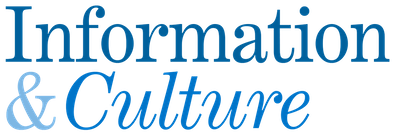Volume 50, Number 1 (Feb/Mar 2015)
The Many Histories of Information
William Aspray
p. 1-23
Abstract
This paper discusses the historiography of information. It argues that information history is represented by (at least) six well-defined sub-disciplines (archival history, book and publishing history, communication history, computing history, information science history, and library history), each in agreement about its own methods and core literature, but which it shares with none of the other five. The paper identifies books that could be read in graduate-levels courses on information history that are taught either chronologically or thematically. It also identifies historical questions that cut across the six sub-disciplines.
Broker of Information, the “Nation’s Most Important Commodity”: The Library of Congress in the Neoliberal Era
Melissa A. Adler
p. 24-50
Abstract
This paper examines the Library of Congress in the context of the neoliberal information economy in order to apprehend the limits to the Library’s support of democratic principles and participation. Situating the Library of Congress within Foucauldian approaches to studying public institutions while building upon them, the paper provides a broad overview of Library of Congress policies and actions since 1985 that signal a neoliberal turn. It also offers an analysis of some of the reports on knowledge organization issued and commissioned by the Library. The paper calls for further critical analysis of the Library of Congress’s policies and strategies.
A Case Study of Collaboration in the Building of China’s Library and Information Infrastructure
Zhixian Yi and Kim M. Thompson
p. 51-69
Abstract
The building of a nation’s library and information infrastructure relies upon more than books and computers, libraries, and other information centers. Although literacy and information technologies have long existed as part of China’s infrastructure, the social ideal of widespread access to information is remarkably recent and has largely been influenced by library collaboration and cooperation with other nations. Using a tripartite information access model, this paper explores the role international collaborations played in building the foundations of physical, intellectual, and social infrastructures of libraries in China during the 20th century and recommends future actions.
Human Computing Practices and Patronage: Anti-Aircraft Ballistics and Tidal Calculations in First World War Britain
Anna Carlsson-Hyslop
p. 70-109
Abstract
During the First World War, both anti-aircraft defense and tide prediction became imperative for Britain. These required lengthy calculations by human “computers.” One such computer, Arthur Thomas Doodson, became prominent in both anti-aircraft ballistics and tide calculations. This article examines the mathematical practices Doodson employed, and, through analysis of his financial backers, why the calculations were carried out. Doodson utilized new calculation practices, both to increase the complexity and amount of computations which could be carried out and to argue for further funding. Historians of science, including mathematics, can benefit from simultaneous analysis of both the practices and the patronage of scientists.
Genetic Information in the Age of DNA Sequencing
Miguel García-Sancho
p. 110-142
Abstract
The claim that genes encode and transmit information is a central conceptual tenet in biomedicine. Historians have placed the origins of this claim in the rise of molecular biology after World War II and philosophers still debate the utility of understanding genes as information for biomedical research. In this paper, I will investigate how ‘genetic information,’ as both a concept and a model for experimental practice, was affected by the emergence, in the mid-1970s, of technologies which enabled scientists to determine the sequence of chemical units of DNA, the molecule which constitutes genetic material. I will argue that DNA sequencing, rather than changing the meaning of genetic information, transformed the possibilities of what could be achieved with this concept, and directed it to large-scale enterprises such as the Human Genome Project. Thus, my argument suggests that scientific concepts should be regarded as entities which, beyond abstract thinking, enable researchers to do things – in this case embarking in a multi-million project aimed at sequencing the information encoded in the human genome.
This issue is available on Project MUSE

